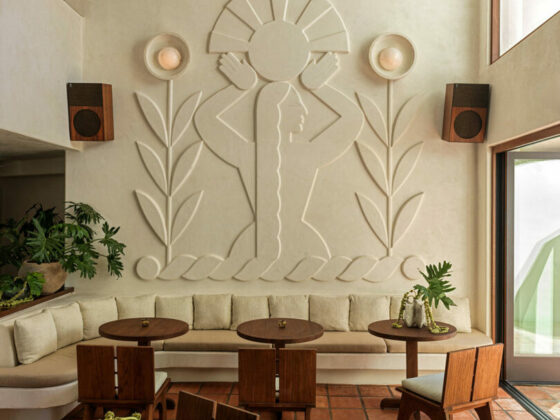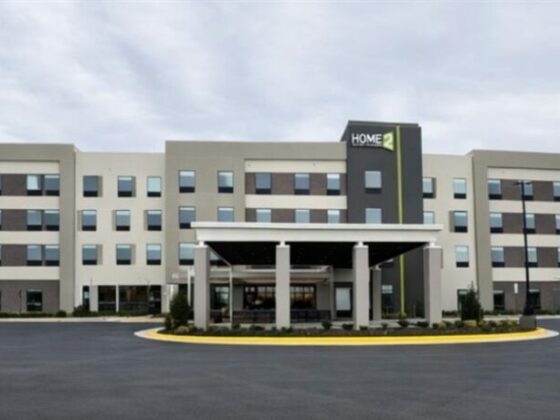What is a hotel renovation?
A hotel renovation involves repairing, replacing or upgrading existing elements of your hotel. The goal is to refresh your space and ensure it meets guest expectations for comfort, safety and modern design. Renovations can include:
- Guest rooms: updating furniture, flooring, lighting or décor
- Bathrooms: installing new fixtures, retiling or upgrading plumbing
- Public areas: refreshing the lobby, hallways, restaurants or shared bathrooms
- Infrastructure: modernising elevators, wiring or HVAC systems
- Exterior: updating the façade, landscaping or signage
It’s important to distinguish between renovation and remodeling. A hotel renovation restores or enhances what already exists, while a hotel remodel changes the structure, layout or functionality of a space. For example, repainting walls or replacing carpets would be considered renovation, whereas reconfiguring room layouts to maximize space in your small hotel rooms or expanding the lobby would fall under remodeling.
In simple terms: a renovation makes your hotel better; a remodel makes it different.

Signs your hotel needs a hotel renovation
From adhering to industry standards to ensuring a positive guest experience, there are many reasons why you may opt for a hotel renovation. Here are some telltale signs that it’s time for a refresh.
Wear and tear
With a constant flow of hotel guests, some wear and tear can be expected at your property, whether that be stained carpets and furniture, chipped paint or broken bathroom tiles.
To sustain a positive impression, you need to keep an eye on and proactively update the look and feel of your hotel. Regular maintenance and impeccable room cleaning prevent your hotel rooms from too much wear and tear.
Outdated design
There’s a big difference between “vintage” and “old.” Vintage is intentional and stylish; old simply feels neglected. If you can’t even remember your hotel’s last makeover, or if guests comment that your design feels dated, get ready to modernize.
Guest feedback
Guest feedback is one of the clearest indicators of when it’s time for a hotel renovation. If reviews repeatedly mention outdated furniture, or that on-site amenities aren’t reflective of the prices they’re paying, or even you’re missing modern conveniences like meeting rooms, it’s time to take action.
Negative reviews can quickly spread online, but responding proactively to constructive criticism not only improves your property – it shows guests that you care about their experience.
Safety and compliance issues
Beyond aesthetics, renovations are sometimes required to meet updated safety codes or legal requirements. Outdated wiring, insufficient fire safety measures or non-compliant accessibility standards can all prompt a renovation. Regularly reviewing compliance helps ensure your guests are safe and your property remains fully certified.
Brand alignment
As a high-quality hotel you want to be sure the physical space matches your hotel’s brand image. The hospitality industry is all about first impressions, and if the first impression guests get when they walk into your public spaces, common areas or see your hotel’s exterior is “old” or “outdated” you will alienate your guests. Hotel renovation is essential to keep up to your brand promise.
Top hotel renovation ideas to improve your property
Exterior renovation
First impressions matter, and your hotel’s exterior sets the tone. Updating landscaping, repainting the façade, or refreshing your signage can make a powerful impact. Guests notice these details before they even step inside. Small touches, such as well-maintained gardens, outdoor lighting or refreshed entryways, can transform the guest experience right from arrival.
Lobby and shared spaces
Mixed-use spaces let you increase revenue through optimized property usage. Say goodbye to underused spaces and experiment with mixed-use. Your lobby can double as a pop-up shop, and the bar could be a coworking space during the day and an event venue at night. The more you can work in flexible spaces in your remodel, the more revenue you can generate.
The lobby is one of the first places a guest can create a first impression which is why it’s an easy way to improve your property. Make sure to make it inviting to create a great first impression. A carefully selected lighting can make the lobby feel like a home away from home. Cozy spaces are also better for staff, who will be more comfortable working in a welcoming environment.
Guest rooms
Guest rooms are the core of your product offering, and even small updates can dramatically improve the guest experience. Swapping old carpets for hardwood floors, refreshing bathrooms, adding mini-fridges, or upgrading bedding can all make a big difference.
You might also consider themed rooms to appeal to specific audiences – for example, family suites, couple retreats or business traveler setups. Partnering with local artists or designers can add an authentic, localized touch, setting your hotel apart from chain competitors and offering guests a stay that feels unique and memorable.
Technology and digital renovations
Digital transformation is reshaping hospitality, and integrating smart technology into your renovation plans is no longer optional. Mobile check-in, digital keys, smart room technology and voice assistants can all enhance comfort and convenience for guests.
Beyond guest rooms, check-in kiosks and self-service options streamline the check-in process, reduce queues and give guests more flexibility. Consider designing your front desk around these tools – allowing staff to roam freely with tablets to assist guests on the go. This creates a more fluid, personal interaction while maintaining efficiency.
Sustainability and green upgrades
Sustainability is becoming a major factor in travelers’ decision-making. Incorporating eco-friendly practices into your renovation not only appeals to environmentally conscious guests but also reduces long-term operating costs.
Use natural light, introduce plants and greenery, or create seamless transitions between indoor and outdoor spaces. Vertical gardens or green roofs can regulate temperature naturally, while energy-efficient devices, motion sensors, low-flow plumbing fixtures and greywater recycling systems all contribute to lower energy and water usage. These upgrades go beyond visual appeal – they show a real commitment to sustainable hospitality.

Hotel renovation planning tips
Renovating a hotel is a major undertaking that requires detailed planning and coordination. Here’s how to manage the process effectively.
Create a comprehensive renovation plan
Identify areas of your property that need renovation, prioritizing based on the condition of the area and how much it impacts the guest experience
Plan your hotel renovation in phases
To minimise disruption, plan your renovation in stages. For example, start by updating guest bathrooms floor by floor before moving on to public spaces. Phased planning allows you to keep operations running smoothly while ensuring consistent quality across the property.
Schedule renovations during off-peak seasons
Schedule your renovations during off-peak seasons and your hotel’s shoulder season. Occupancy is typically lower, meaning fewer guests are affected. Guests staying during this period may also have lower expectations, allowing for more flexibility without compromising satisfaction.
Budget carefully for maximum impact
Renovations often run over budget, so plan conservatively. Build in a contingency buffer to account for unexpected expenses and prioritize upgrades that deliver the highest impact for your investment. The goal is to refresh strategically – achieving visible improvement without unnecessary overspending.
Hire experienced hotel contractors
Work with professionals who understand the hospitality industry. Experienced hotel contractors can advise on efficient scheduling, compliance and guest safety during construction. In some cases, a short-term closure may even be more cost-effective than prolonged disruption – a professional team can help you assess the best path forward.
Communicate updates with guests
Transparency goes a long way. Keep guests informed about renovations through emails, signage or pre-arrival communication. Explain what’s being improved and how it will enhance their future stay. Blocking off construction areas and maintaining a clean, safe environment are essential for maintaining trust and satisfaction.
Utilise the right technology
Hotel management software can play a major role in managing renovations. Use it to block off rooms under construction, adjust pricing and availability, and track real-time occupancy. Having the right tools in place will ensure renovations run smoothly without disrupting operations or guest experiences.
Conclusion
A well-executed hotel renovation can transform your property, elevate your guest experience and drive long-term profitability. But success depends on careful planning, smart budgeting and collaboration across teams and stakeholders.
Before starting, conduct a full cost-benefit analysis and involve your management team, department heads, and even loyal guests for feedback. Their insights can help you design a space that not only looks stunning but also functions better for both guests and staff.
When done right, a hotel renovation doesn’t just refresh your property – it redefines your business for the next chapter of hospitality.
Download our guide “Maximizing Your Property’s Full Potential”











